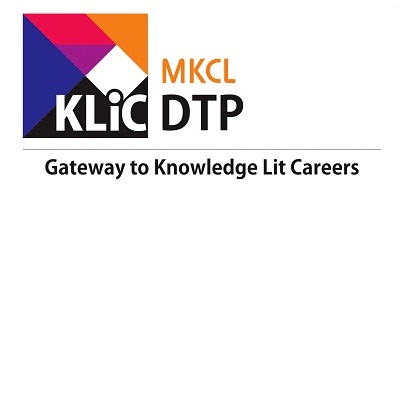About the Course
Desktop publishing refers to the design and production of publications using personal computers with graphics capability. Desktop Publishers create a number of materials, such as brochures, magazines, newspapers and books with the help of computer software programs. They are responsible for the entire implementation and design process from start to finish. Employers of DTP operators include printing, publishing, graphic design and advertising companies.Course Details
Most Desktop publishers work in the publishing and printing industries. Others have jobs in in-house printing departments of advertising and public relations firms. Those who are more artistic and who have furthered their education may find opportunities in graphic design or commercial art. Careers in desktop publishing range from web publication designers, layout artists, compositors, typographers, electronic publishing specialists and prepress technicians, DTP operators, and image design specialists.
Certification:
- KLiC courses are recognised by Yashwantrao Chavan Maharashtra Open University (YCMOU).
- MKCL provides certificate to the KLiC learner after his/her successful course completion.
- Yashwantrao Chavan Maharashtra Open University (YCMOU) provides mark sheet to successfully passed KLiC learners (Jurisdiction: Maharashtra).
Important Dates:
- Batch Commencement: One batch in each calendar month (January to December)
- Date(s) of Application and Fee Payment by Learner: 1st - 30th day of each calendar month
- Date(s) of Learner Confirmation by ALC: 1st - 30th day of each calendar month
- Course Start Date and Date of Issuing Learner Login: Date of admission confirmation
The Academic Approach of the course focuses on the work centric education i.e. begin with work (and not from a book !), derive knowledge from work and apply that knowledge to make the work more wholesome, useful and delightful. The ultimate objective is to empower the Learner to engage in socially useful and productive work. It aims at leading the learner to his/her rewarding career as well as development of the society.<
Learning methodology
- Learners are given an overview of the course and its connection to life and work.
- Learners are then exposed to the specific tool(s) used in the course through the various real-life applications of the tool(s).
- Learners are then acquainted with the careers and the hierarchy of roles they can perform at workplaces after attaining increasing levels of mastery over the tool(s).
- Learners are then acquainted with the architecture of the tool or Tool Map so as to appreciate various parts of the tool, their functions and their inter-relations.
- Learners are then exposed to simple application development methodology by using the tool at the beginners level
- Learners then perform the differential skills related to the use of the tool to improve the given ready-made outputs.
- Learners are then engaged in appreciation of real-life case studies developed by the experts.
- Learners are then encouraged to proceed from appreciation to imitation of the experts.
- After imitation experience, they are required to improve the experts outputs so that they proceed from mere imitation to emulation.
- Finally, they develop the integral skills involving optimal methods and best practices to produce useful outputs right from scratch, publish them in their ePortfolio and thereby proceed from emulation to self-expression.
Coral Draw
Skills: Working Place, Customizing, Image and Color Modifications, Case Study - Black & White to Color, Using the Brush and Paint, Working with Selections, Scaling, Knowing the Layers, Filter Gallery, Color Adjustments
Outputs: Photo Manipulation, Photo Collage, Poster Design, Wedding Card
Wedding Card

Poster

CorelDraw
Skills: Understanding the Color Palette, Working with the Objects, Understanding other controls (Layers and Tables)
Outputs: Visiting Card, Sticker, Letterhead with Logo, Wedding Card, Flex Banner, Flyer with Coupon, Brochure
Visiting Card

Flex Banner

Detailed Syllabus:
KLiC DTP (CorelDraw)
Adobe Photoshop
- Basics of Photoshop
- Introduction
- The Working Place
- Customizing
- Image and Color Modifications
- Tools
- Using the Brush and Paint
- Working with Selections
- Scaling
- Knowing the Layers
- Filter Gallery
- Color Adjustments
- Settings
CorelDraw
- Getting Started with CorelDraw
- Introduction to CorelDRAW
- The CorelDRAW User Interface
- Understanding the Basics in CorelDRAW
- Working with the Page Set-Up
- Working with Files
- Understanding the basic controls
- Understanding the Viewing Options
- Psychology of colors
- Harmonious Colors
- Selecting colors
- Settings for Typing in Shree-Lipi
- Working with Tables
- Understanding the Color Palette
- Working with the Objects
- Understanding other controls (Layers and Tables)
- Other Features
120 Hours to be covered in 2 months (8 weeks).
Fees Structure for the year 2020
DTP Fees at ALC Mode
| Mode | Total Fee (Rupees) |
1st Installment (Rupees) |
2nd Installment (Rupees) |
| Single Installment | 4100/- | 4100/- | N/A |
| Two Installments | 4300/- | 2700/- | 1600/- |
Total fee is including of Course fees, Examination fees and Certification fees
MKCL will provide world-class interactive eLearning content at no extra cost
Evaluation Pattern of KLiC Courses consists of 4 Sections as per below table:
| Section No. | Section Name | Total Marks | Minimum Passing Marks |
|---|---|---|---|
| 1 | Learning Progression | 25 | 10 |
| 2 | Internal Assessment | 25 | 10 |
| 3 | Final Online Examination | 50 | 20 |
| Total | 100 | 40 | |
| 4 | SUPWs (Socially Useful and Productive Work in form of Assignments) | 5 Assignments | 2 Assignments to be Completed & Uploaded |
YCMOU Mark Sheet:Printed Mark Sheet will be issued
by YCMOU on successful completion of Section 1, Section 2 and
Section 3 and will be delivered to the learner by MKCL.
YCMOU Mark Sheet will be available only for Maharashtra jurisdiction
learners
MKCLs KLiC Certificate will be provided to the
learner who will satisfy the below criteria:
- Learners who have successfully completed above mentioned 3 Sections i.e. Section 1, Section 2 and Section 3
- Additionally, learner should have completed Section 4 (i.e.
Section 4 will comprise of SUPWs i.e. Socially Useful and
Productive Work in form of Assignments)
- Learner has to complete and upload minimum 2 out of 5 Assignments
MS-CIT passed preferred.
Should preferably be a 10th/12th Std. passed student. (Not compulsory)
Examination
Topics for KLiC 2020 Final Examination
| Objective Topics | Practical Topics |
| Internet, The Web and Electronic Commerce | Windows 10 |
| System Software | MS-Word 2013 OR Open Office.org Writer |
| The System Unit | MS-Excel 2013 OR Open Office.org Calc |
| Input and Output | MS-PowerPoint 2013 OR Open Office.org Impress |
| Secondary Storage | Internet Explorer 7.0 OR Mozilla |
| MS-Outlook 2013 OR Mozilla Mail |
Examination Pattern
- Duration of Exam: 60 minutes (1 Hour)
- Total Questions: 50, Total Marks: 50
- Marks per Question : 1
- All the questions in the examination are divided into 3
levels.
- Level 1 = Low difficulty level
- Level 2 = Medium difficulty level
- Level 3 = High difficulty level
- Exam Pattern: Level wise distribution of questions
and Marks
Level Difficulty No. of questions Marks per question Maximum Marks Objective Practical Total 1 Low 6 14 20 1 20 2 Medium 6 14 20 20 3 High 3 7 10 10 TOTAL 15 35 50 50
Re-examination:
Re-Exam fees: Rs. 355/-
- Please note that in the case of failure or absenteeism in the first available final online exam attempt, Learner can appear for re-examination for next two consecutive available exam events by paying requisite fees. If Learner remains absent or fails in these two attempts, s/he will have to register afresh again by paying full Course Fees.
| Details |
MS-CIT@ALC (MS-CIT Regular) Mode |
MS-CIT@Home Mode |
MS-CIT
Online Mode |
|---|---|---|---|
| Extension | If the student does not complete the course within the stipulated time or schedule, he / she will be sent to the next Exam Event | If the student does not complete the course within the stipulated time or schedule, he / she will have to re-enter | If the student does not complete the course within the stipulated time or schedule, he / she will have to re-enter |
| Re-Exam | In case of failure / absence of first attempt of examination, such students will have to pay re-examination fee for further examination and only two additional opportunities. | He / she will have to re-enter if he / she fails the first attempt of the exam | He / she will have to re-enter if he / she fails the first attempt of the exam |

